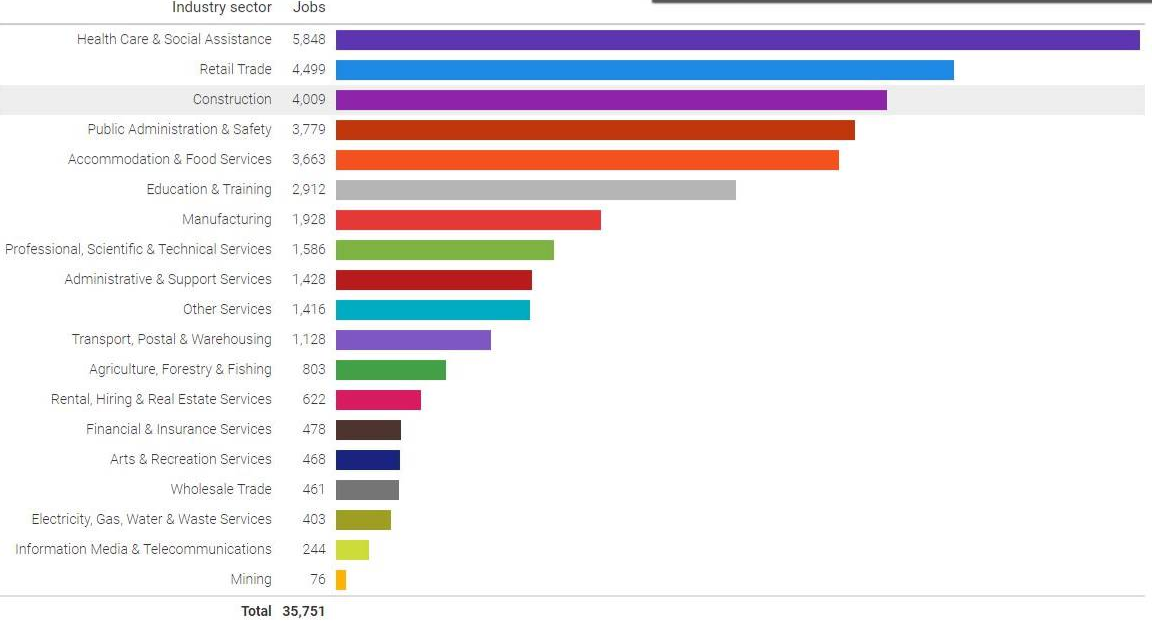COVID Economy - South Coast Register - 1 May 2020
Thu 07 May 2020
A diverse economy will protect the Shoalhaven from the worst economic impacts of the COVID-19 pandemic, but unemployment is still likely to increase to just under 18 per cent before the end of the year.
That's the analysis from Greg Pullen, Economic Development Manager at Shoalhaven City Council.
Mr Pullen used an economic modelling tool - REMPLAN - to project what industries will be hardest hit, and how long the road to recovery will be.

Employment in the Shoalhaven, Health, retail, public administration and construction are some of the biggest employers in our region
He said the most important takeaway was that many industries in the Shoalhaven are unlikely to experience significant setbacks.
"The Shoalhaven is a mixed bag of industries," he said.
"About a third of people in the area work for government sector employers, like the jail, hospital, council and defence.
"They're getting paid reliably. Then we have a group of bigger organisations like Manildra and Sikorsky who are ticking along.
"All together, about 60 per cent of employers are operating as they were before Christmas."
Of the remaining 40 per cent, "discretionary retail" - stores that sell non-essential goods such as gifts - and businesses that rely heavily on tourism are likely to be hardest hit, as people are less likely to be out shopping for leisure.
Arts and recreation spending is also down.
Supermarkets, however, are booming.
"Motels and hotels have lost trade over the summer months and will find it difficult to recoup those losses going forwards," Mr Pullen said.
"Some have been able to adapt by providing accommodation for essential workers.
"Many restaurants are in a similar position and are trying to adapt by providing takeaway and delivery options.
"There have been disruptions to the supply chain in construction, but they have managed to continue trading."
The biggest challenge for many businesses will be decreased trading over summer as a result of bushfires in combination with restrictions on trading due to social distancing measures.
Some businesses had lost equipment or premises to the fires as well.
If lockdowns recur frequently, recovery will take longer, particularly if there are COVID-19 outbreaks in the Shoalhaven.
The southern Shoalhaven may take longer to recover, as it was hit harder by the bushfires, and recovery for the tourism and discretionary retail sectors may take eighteen months or more.
Mr Pullen expects about 2800 people in the region will lose their jobs this year, and pensioners on a private pension may also take a hit of up to 20 per cent of their payments from June 30.
He is confident, however, that the dent in the Shoalhaven's economy will be a manageable one,
"I expect a 2.2 per cent decrease in the output of the Shoalhaven economy in 2020 compared to 2019," he said.
"The loss of income for the entire area will be $95 million, or about three per cent, and a shrinkage of about four per cent of gross regional product.
"The Shoalhaven - especially the northern Shoalhaven - will come out of the COVID-19 disruption quicker than most regional economies.
"We're lucky to have robust representation in all sectors of employment, and good operators in all of those sectors."
Story: Zoe Cartwright, South Coast Register